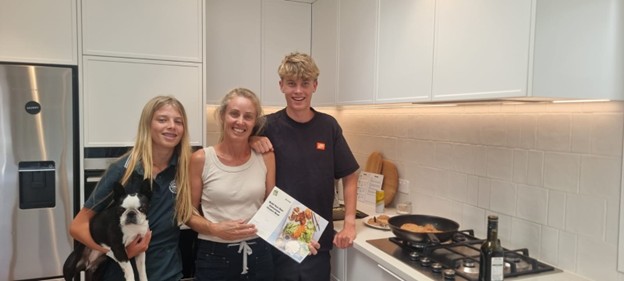
Nutrient absorption is the key to good health, and this vital process occurs in the small intestine.
Located just after the stomach, this section of the digestive tract is often referred to as the “gut”. Trillions of bacterial cells call the gut their home, and collectively they contribute several of the metabolic processes in our body. Some of the bacteria’s work includes vitamin production, maintenance of the cells in the digestive walls and breakdown of the nutrients we eat.
Topical when talking all things gut health, we’ll touch on the pre- and pro- biotics. Prebiotics (a type of fibre, an indigestible component of food, used by gut bacteria to promote cell maintenance) and probiotics (live bacteria found in foods or supplements) can contribute to gut function and health.
But the bottom line is, if your gut isn’t healthy and functioning well, nutrients won’t be absorbed effectively.
Fibre and Fluid
Fibre is essentially the food matter that can’t be absorbed by the body as energy and nutrients, so this is what makes up the bulk of what comes out the other end. It’s important that fibre, is accompanied by adequate fluids too, as these work hand in hand to move waste through the gut. Fibre alone won’t move effectively — think of going down a hydroslide and how difficult this would be to move with no water to slide down on. Fruit and vegetables are one of the best sources of fibre, because of the natural pairing with fluids (think a juicy kiwifruit).
As mentioned earlier, fibre is a prebiotic, and is used by our gut bacteria as an energy source. It’s important we fuel our gut bacteria, so they can then help with the maintenance and renewal of the cells lining our digestive tracts. Additionally, these little guys work hard to digest our food and activate our digestive enzymes. It’s important to keep this environment of good bacteria happy, as it’s the imbalance of good and bad bacteria that can lead to both short-term and long-term health issues in the gut.
We all loathe the feeling of an upset gut, the lethargy and uncomfortable sensations that comes with irregular bowel movements are the result of our gut bacteria producing excessive gas. When our gut is bloated, or we’re experiencing constipation, the absorption of nutrients can be reduced.
Mindfulness
In addition to maintaining fibre and fluid, practising mindful eating is a good way to identify and foods that may trigger bloating . This process involves being aware and mindful, of the foods that regularly set off a bloated or sore gut. Commonly identified trigger foods include dairy such as milk, ice cream or yoghurt or gluten such as a slice of bread.
For some people with more sensitive guts, certain types of sugar molecules, which are found across a variety of fruits, vegetables and legumes can trigger bloating, gas and irregular bowel motions. These sugars are known as FODMAPs (Fermentable, Ogliosaccharides, Disaccharides, Monosaccharides and Polyols — for more info on these, check out Monash University Fodmap resources online). Examples of these foods include onions, garlic, cabbage, apples, chickpeas or beans.
Knowing the foods that upset our gut, and eating these in a much smaller quantity, and less frequently, will not only reduce the pain and swelling, but will prevent our gut from being irritated. That way it can focus more on nutrient absorption and less on healing itself.
Movement and Chewing
Our body works to move food into and through our intestines via a wave-like action called peristalsis. This occurs naturally, however when we exercise or even simply walk from place to place, peristalsis is stimulated further. A 30-minute walk, jog or even a game of tennis will help get our guts moving in a regular motion.
We’ve all heard it before, but it is important that we chew our food well! The smaller food is when it enters our gut, the easier it is for our gut to digest. As well as this, chewing stimulates stomach acid and digestive enzymes in our saliva, which both work to aid digestion, and therefore nutrient absorption.
Chewing our food a few more bites each mouthful is going to mean dinner time takes a little longer than usual, but that too has many benefits, beyond longer enjoyment of our tasty food. The feeling of being full is onset by a hormone called leptin, but this hormone takes a good 20 minutes to kick in from the time you start eating. By eating slowly, we begin to realise we might not need a second serving, or a smaller portion of food is actually plenty, reducing the chance of over-eating.
Probiotics
In contrast to a prebiotic, a probiotic is something that contains living bacteria — fermented foods, yoghurt or supplements. While the theory suggest that ingesting probiotics, to introduce good bacteria to the gut flora, aids gut health, research is yet to prove that this ingested bacterium is able to reach and colonise the intestines, having to endure the very acidic environment that is the stomach.
Top points:
· Prebiotics, or fibre are essential for creating a happy and energy rich environment for our good and helpful gut bacteria to feed off
· Fibre also helps to keep regular movement through the bowel
· Upkeeping an adequate amount of fluids each day will also help with regular bowel movements, aim for at least 8 glasses a day
· Practice mindful eating, become aware of your trigger foods to an upset gut
· Keep in motion, move or exercise for at least 30 minutes a day
· Take time to enjoy dinner slowly, spend a little longer chewing each bite
· Probiotics, whilst spoken about a lot, research is yet to prove the full effect or benefit
Click here to return to Fresh Start Blog

